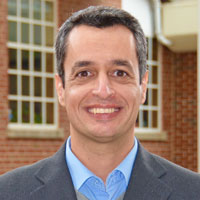Commentary calls for better documentation of wartime attacks on health-care facilities and patients
July 14, 2016
In an article published online July 4 in the journal Medicine, Conflict and Survival, UNC Gillings School of Global Public Health researchers examine the complex and disturbing pattern of health-care professionals being targeted in war zones.
Dilshad Jaff, MD, MPH, Gillings School alumnus and research adviser for conflict prevention and disaster preparedness in the School’s Gillings Global GatewayTM, is lead author of the commentary, “Targeting Health Care in Armed Conflicts and Emergencies: Is it Underestimated?”. Maternal and child health faculty members Kavita Singh Ongechi, PhD, research associate professor, and Lewis Margolis, MD, MPH, associate professor, are co-authors.
In earlier wars and conflicts, the neutrality of hospitals and medical personnel was honored, and those caring for the injured on both sides of a conflict could assume some protection from attack. In 2014, however, at least 40 armed conflicts were underway in which civilians, health professionals and the wounded were targeted specifically.

Dr. Dilshad Jaff (right) works with a colleague at a hospital in Iraq to devise a safe way to dispose of used syringes. Jaff’s work in conflict zones has improved the health and safety of medical personnel and their patients.
Jaff and colleagues attempt to highlight the inability to obtain reliable information about the extent of such attacks and argue that organizations charged with protecting health and health care should collaborate, communicate and share information more effectively. Among these organizations are the International Committee of the Red Cross, the United Nations, World Health Organization, nongovernmental organizations focus on human rights and health care, and the U.S. State Department, all of which have been slow to document statistics about attacks on health care systems.
In addition to the difficulty of cataloguing and recording instances of attack, there also has been a reluctance to share information between and among organizations, sometimes because of the competitive funding environment.
“International agencies are engaged in an ongoing balancing act, a conflict of interest,” the authors write, “between their commitment to the well-being of health workers, on the one hand, and the risks of losing any opportunity to make a difference for suffering populations in conflict zones, on the other hand, because of dependence upon national and local governments and powerbrokers.”
The attacks on health-care systems therefore go unreported.
“Wartime attacks on medical personnel and their patients constitute a serious problem that demands immediate attention,” Jaff said. “We wrote the article to highlight this issue and, ultimately, to stimulate collective action that will protect physicians and nurses who serve in conflict zones.”
Share
Gillings School of Global Public Health contact: David Pesci, director of communications, (919) 962-2600 or dpesci@unc.edu

